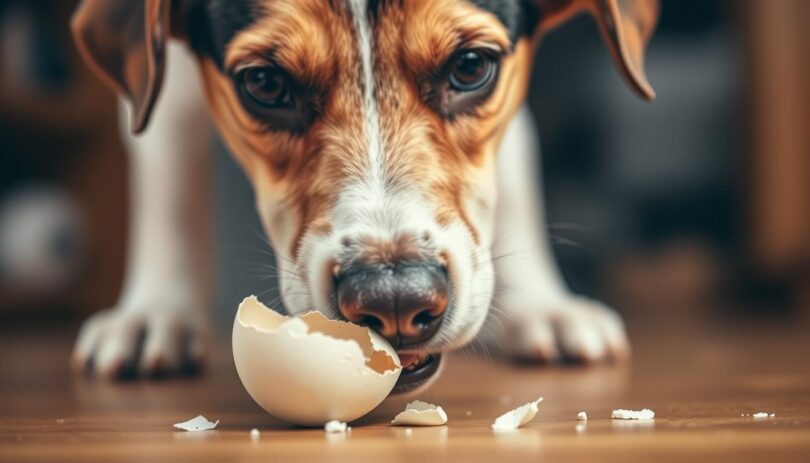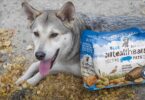You may have asked yourself as a dog owner whether it is safe to share your breakfast eggs with your furry friend. Although eggs may be a healthy snack to dogs, the issue of whether they can consume eggshells is a little more complicated. Eggshells that are prepared properly can be beneficial, but there are dangers to be aware of.
Eggs are rich in quality protein, vitamins and minerals which help in the overall health of your dog. Eggshells, however, contain a lot of calcium, which is excellent in your dogs bones and joints. Research indicates that eggshell membranes may even assist in joint pain and mobility.
However, it’s crucial to prepare eggshells safely. Raw eggshells can pose bacterial risks like salmonella. Boiling them before use can mitigate this risk. You should also add eggshells to the diet slowly to prevent gastrointestinal problems and check with your vet that they are compatible with your dog and part of his or her balanced diet.
To learn more professional recommendations on the digestion of your dog, go to this site.
Understanding the Nutritional Power of Eggs and Eggshells
Eggs and eggshells are an inexhaustible source of nutrition that helps to keep your dog healthy. Eggs contain high quality protein, vitamins, and healthy fats, which makes them an excellent supplement to your dog. Eggshells, however, contain vital minerals such as calcium that helps in building strong bones and joints.
Nutrient Breakdown of Eggs
Eggs are a food that contains a lot of nutrients, containing approximately 75 calories, 6 grams of protein, and essential vitamins. These nutrients will assist in maintaining the health and energy of your dog. Eggs also have healthy fats that lead to a glossy coat and healthy skin.
Key Minerals in Eggshells
Calcium carbonate, which is essential to bone health and muscle functioning, is the main component of eggshells. Eggshell membrane includes collagen and glucosamine that may alleviate joint pain and enhance mobility, which is confirmed by a 2016 study.
Including eggs and eggshells in the diet of your dog will help you supply them with the necessary nutrients that will help them maintain their wellbeing. Always check with your vet to make sure the diet is balanced and appropriate to your dog.
Safe Ways to Prepare Eggs and Eggshells to Your Dog
It is important to be attentive to details when preparing eggs and eggshells to your dog as it should be safe and as nutritious as possible. Proper preparation minimizes health risks as well as increasing digestibility.
Proper Cooking Techniques for Eggs
To destroy potentially harmful bacteria such as salmonella and inactivate the enzymes in raw egg whites that may inhibit nutrient absorption, eggs should be cooked. Boil eggs without adding butter, salt, or other seasonings. The ideal internal temperature for cooked eggs is 160°F. This makes the eggs safe and easy to digest by your dog.
Creating Fine Eggshell Powder
Bacteria should be eliminated by cleaning and boiling eggshells. After boiling, allow them to dry thoroughly then grind them into a fine powder using a food processor or coffee grinder. This powder contains high levels of calcium and can be sprinkled on the food of your dog. Begin with a small dose to avoid digestive upset and increase slowly, as required.
Never change your dog diet without consulting your veterinarian as it should be balanced and should suit the needs of your dog.
Can dogs eat egg shells: Safety Considerations and Risks
It is necessary to balance the benefits and risks when it comes to the question of whether your dog can eat eggshells. Eggshells may be a good source of calcium but, when mishandled, they may cause health problems.
Identifying Bacterial Threats and Salmonella
Raw eggshells may contain dangerous bacteria such as salmonella, which is a great threat to the health of your dog. To eliminate this threat, boiling eggshells is essential. This will greatly minimize the chances of bacterial contamination and hence safer to consume.
Guidelines on Avoiding Over-Supplementation
While calcium is beneficial, too much can cause problems. Too much calcium may cause constipation or even kidney stones. Add eggshells slowly, in small quantities to observe the response of your dog. Always consult your vet to ensure you’re not over-supplementing.
A little bit of unproperly processed eggshell can lead to health problems. Monitor your dog after adding eggshells to check whether he/she is suffering or not. Your vet can give you specific recommendations depending on the needs of your dog in case you are not sure.
Integrating Eggs and Eggshells into a Balanced Dog Diet
Eggs and eggshells can be a healthy and useful addition to your pup when it comes to improving his or her meals. Nevertheless, you should do it in a reasonable way so that the diet of your dog could be balanced and secure.
Appropriate Serving Sizes for Different Breeds and Ages
Veterinarians recommend starting with small amounts. With homemade diets, 1 teaspoon of eggshell powder to 1,000 calories is a good starting point. This allows you to monitor how your pup reacts. It is important to remember that all dogs are individuals, and changes can be made depending on size, age, and health problems.
Tips for Gradually Introducing Eggs to Your Dog’s Meals
Eggs can also be used together with other supplements to provide the calcium requirements of your dog. As an example, you can combine eggshell powder with a little fish oil to get an extra benefit. Remember this: eggs are a supplement, not a substitute to your pup regular and balanced dog food.
Tracking your dog’s reaction is crucial. Write a diary to record any alterations in appetite, energy levels or quality of stool. In case you suspect something strange, you should always consider consulting your veterinarian to get the personal recommendation. Eggs and eggshells can be healthy and positive addition to your pup diet with proper planning and consideration of your pup needs.
Exploring Additional Health Benefits for Your Dog
There is more to eggs and eggshells than the basics that your dog can enjoy. These modest supplements may help with joint health, skin and coat quality and even general vitality. So, how can these advantages make a difference to your furry friend? Let us find out.
Support for Joint Health and Mobility
Eggshell membranes contain collagen and glucosamine, which are natural miracles to the joints of your dog. These nutrients assist in keeping joints functional which is particularly essential in older dogs or dogs with mobility problems. You can keep your dog moving comfortably by helping to lubricate the joints.
Enhancing Skin, Coat, and Overall Vitality
Eggs are full of fatty acids and vitamins which are magic to the skin and coat of your dog. Shiny, healthy coat and soft skin are only the beginning. The vitamins in eggs also help with overall vitality so your dog can feel their best each day.
When made without additives, scrambled eggs are a wonderful treat every now and then. And, opting to buy eggs that were produced in free-range farms can translate to additional nutrients to your dog. When supplemented properly, you will notice actual results in their health and energy levels.
To get professional guidance on how to keep your dog digestive health, refer to this site. Eggs and eggshells are a healthy, nutritious addition to the diet of your dog with just a bit of planning.
Wrapping Up Your Approach to Feeding Eggs Safely
As far as feeding your dog eggs and eggshells are concerned, safety and balance is the key. Trustworthy sources stress that with the help of proper preparation, you can make your dog much healthier and minimize risks. It is always a good idea to consult a vet to make sure you are making the best decisions concerning your pet.
Begin by using quality eggs that are supplied by reliable sources to reduce the risk of contamination. Add eggs and eggshell powder slowly, starting with low doses to check how your dog reacts to it. This gradual feeding will avoid digestive problems and you can feed them accordingly.
Keep in mind that eggs are not a substitute to your dog regular meals. A balanced diet with varied nutrients ensures overall well-being. To learn more about how to make your dog healthy, refer to this site.
Be knowledgeable, keep your dog healthy and consult a professional. Eggs and eggshells are a nutritious addition to your dog diet, which will help him to stay healthy and live longer with proper planning.
FAQ
Are eggshells a good source of calcium for dogs?
Yes, eggshells are a good source of calcium that is vital in the health of your dog and its bones. They also have other useful minerals such as phosphorus and magnesium. Nevertheless, they should always be ground into a fine powder and slowly added to prevent digestive problems.
Are raw eggs a risk of Salmonella to dogs?
Raw eggs may contain Salmonella bacteria that may be dangerous to dogs, yes. To reduce this risk, make sure to use clean and fresh eggs and think about cooking them prior to serving. Cooked eggs are safer and still packed with nutrients.
How do I add eggshell powder to my dogs diet?
The dosage of the eggshell powder will vary according to the size, age and need of your dog. A rule of thumb is to begin with a low dose (approximately 1/4 teaspoon per 10 pounds of body weight) and check with your vet to make sure you do not over-supplement.
Can dogs benefit from the membrane inside eggshells?
Absolutely! Collagen and other nutrients that maintain joint health and mobility are found in the eggshell membrane. When made properly, it is a healthy and natural supplement to your dog.










Leave a Comment